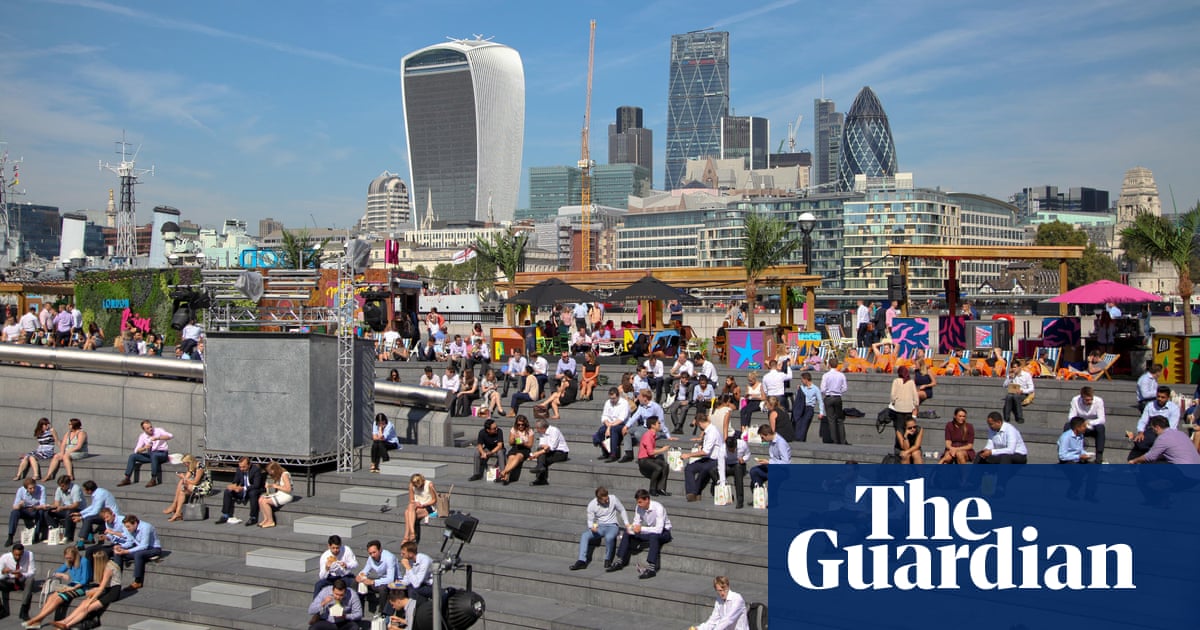A maximum indoor temperature working law giving people a day off if workplace temperatures surpass 30C should be mandated by government, a new report recommends.
The report by the Fabian Society thinktank highlights inequalities in who bears the brunt of the impacts of climate breakdown and puts responsibility on bosses and landlords to stop people from overheating.
An increasing number of people are dying from excessive heat in the UK. More than 4,500 people died in England in 2022 due to high temperatures, which was the largest figure on record. Between 1988 and 2022, almost 52,000 deaths associated with the hottest days were recorded in England, with a third of them occurring since 2016, data from the Office for National Statistics shows. During the same 35-year period analysed, more than 2,000 people died in Wales due to the warm temperatures.
I just want to work from home really.
What if you’re home is over 30C
Just wear shorts and light clothing I guess.
I would do 30c at home rather than commuting.
And British used to joke about Spanish siesta… Now they want to close everything at Spanish spring’s temperature
Spain has air conditioning systems.
But how are Americans going to know when it’s 30 degrees Celsius?
We could get nuked and they still make us go in.
Oh yeah we need this rule in Australia. I’d be going home right now!
Ah mate! It’s 40 degrees tomorrow with severe fire warnings, fucken oath we should have the day off. Might as well give us off until after Chrissy as it’s gonna be a scorcher.
86 F for Americans.
Seems warm for manual labor, seems fine for typing.
Many of our buildings are built to deal with cold winters, rather than hot summers. 30 is fine in a properly designed office. Add in stale stuffy air, and rising humidity and it quickly becomes extremely unpleasant.
I’ve worked full tilt, outside in 42°C temperatures, without issues. 32 in UK buildings and weather can leave me effectively useless.
The way to build for cold winters is effectively the same as for hot summers, thick insulation and ventilation. There’s a few differences but the fundamentals are the same. UK houses are just shite all round, built for cheap construction costs and maximum developer profit.
‘Fine’ if they’re fine with me wearing a tanktop and track shorts. I can be motionless and sweat at 85+ F
Indeed. A shirt and trousers is absolutely lovely attire for sitting in a room that’s 30°C. No thanks.
Ehh, my ac unit wasn’t working properly this summer. I’m in the southern US. It would get up to 85° F in the house and I’d be pretty sweaty by the end of the day.
Sure, it was fine, but it wasn’t comfortable by any means.
I’m guessing the humidity was way lower wherever you were comfortable at 30°C, it’s fine at the beach but in Britain it makes your brain start to melt!
Where do you live? I’ve never seen that enforced in the US.
I am afraid you have responded to the wrong comment. I said nothing about the US rules, I was changing temperature measurement standards.
Hmm, the issue here is that the office temperature is lower than the temperature if I’m working from home, so all it would mean is I’d be forced to go into the office on my WfH days! At least I’d be cool until I go home again I guess…
What about forges and other industrial places where it gets hot as balls?
deleted by creator
For future reference, this comes under “Duty of care” in UK law. I’ve found raising “Duty of care concerns”, in a written form (e.g. WhatsApp), remarkably effective. It basically takes away any wiggle room they have, if it escalates.
For me, it is often related to driving. The client wanted me to cram too many long days and long drives together. It would apply to any safety situation however.
Most jobs don’t require working with dangerous chemicals, but some do. Some jobs will be the exception, but should also be the ones that have specific safety training and equipment for those conditions which won’t be in place for office or other similar jobs.
People working at a forge should have training on recognizing symptoms of overheating and adequate cooling and hydration practices (even if a lot of them don’t) as forges can’t be cooled in a feasible way. Office workers or people in jobs where it is not expected to be hot are far more likely to accidentally overheat.
Maybe they could retrofit air conditioning for worker safety?
I work on an installation where there’s a forge. I took a tour of it when I first started working and there’s no way in hell you can effectively air condition that place without being extremely wasteful. Maybe I’m wrong and other forges have figured it out, but I’d love to see proof of it.
Nah, no way to do it with molten metal being right there. It’s a part of the job, and a reason why a lot of countries don’t have a “maximum temperature” law, but have a “minimum temperature” one.
That sounds like an edge case that may need more creative solutions, or implementing breaks, etc. But I’d wager that for most workplaces this isn’t the case.
You can get air fed suits for toxic environments. I have seen these used in car manufacturing. From accounts of the lads there, they were very heavy to work with.
Right? Every restaurant in the country would be closed immediately and indefinitely.
Not that that’s a terrible thing or anything
And from my experience- every local council service.
This is the best summary I could come up with:
The report by the Fabian Society thinktank highlights inequalities in who bears the brunt of the impacts of climate breakdown and puts responsibility on bosses and landlords to stop people from overheating.
Drawing on advice from experts from a range of organisations including the National Infrastructure Commission, the London School of Economics and the University of Oxford, the Fabians have drawn up a plan to prevent illness and death from the increasing extreme heat predicted to happen in the UK due to climate breakdown.
It found that “low-paid workers often lack sufficient access to water, can not escape the heat, and have to wear uniforms or personal protective equipment (PPE) designed for cooler temperatures.” Hospitality and manual workers are most likely to face excessive heat, but also employees in education establishments and offices can suffer if they are working on higher floors or in areas with big windows and poor ventilation.
The report also calls for tougher climate resilience requirements on infrastructure providers, and a ban on the burning on upland peatlands as well as investment in the maintenance of flood defences currently in poor condition.
It says: “The Conservative government’s most recent National Adaptation Programme lacks substantive new plans or investment to prepare for future climate impacts.
The report also warns that the electricity system, transport infrastructure and schools and hospitals could all be at risk of shutdown due to overheating.
The original article contains 565 words, the summary contains 232 words. Saved 59%. I’m a bot and I’m open source!
Wtf that’s not even hot! Might as well just keep Florida closed year round lol
I’m wondering how long it takes until climate activists start advocating against it (because it would increase the use of AC and thus emissions/energy use, and decrease the amount of people suffering from the heat).
I think companies wouldn’t want to let their employees get off free, so they will probably be the first ones to be against this.
Not sure why climate activists would want people to suffer. Everyone is still hot, doesn’t matter if working or not
Of course companies will be against it.
Not sure why climate activists would want people to suffer.
Some because they think it’ll make people more aware of the problem and create more pressure to act, others because they think suffering is a virtue, people deserve it for what they have done to earth, and similar nonsense positions.
I feel like you’re just having imaginary arguments in your head with people who don’t exist. This is a net win for everyone because it means less people suffering in extreme conditions and it also puts pressure on companies and people with money to slow climate change.
Maybe there’s some weird people out there who want others to suffer but I doubt that’s anywhere near representative of climate activists.
Seen it far too often unfortunately.
And in some cities they got air conditioning banned or de-facto banned (made so expensive with additional hurdles that it’s unaffordable for most, ironically often leading to people using extremely inefficient hose-out-the-window monobloc units that you can buy without asking anyone for permission).
That sounds pretty silly, the real changes need to come from the ways we generate our electricity, not how individuals use it. I’m mostly just surprised activists managed to affect policy at all, though. But still that sounds more misguided than malicious.

I’m all for improved passive cooling measures before we jump to using A/C.
Wait, yall work in offices at 86F? What is wrong with you guys? Why do you guys have so many problems with AC? People are dying because you guys havent figured a 100 year old invention yet?
deleted by creator
Y’all got windows though right? You could throw some portables in.
deleted by creator
I would consider not having heat stroke a health and safety concern.
Fucking hell, I knew the UK had issues, but thats just fucked up.
deleted by creator
It’s all part of growing up and being British!
But theres no reason to. Why would guys not do basic stuff? Hell, even in America OSHA gets involved past 80f/27c
So what gives?
Probably half the offices I’ve worked at had no AC at all. One job I had moved to a new building that didn’t have AC, they spent a fortune installing it, then were required to remove it when they vacated the building a few years later.
Really? I’ve never worked on an office without AC. Maybe I’ve just worked in posh offices
Thats absurd. People die without AC, wtf is wrong with the brits?
There are many old buildings, and historically it hasn’t often been warm enough to make air conditioning worth it. But the climate is getting warmer now.
If you’re also an American, as looks to be the case from your comments, Europe has more-moderate extreme temperatures than parts of the US do; most of it is near water, which helps moderate temperature, and it has few arid places. The UK, which is an archipeligo, particularly so.
There are some places in Europe where air conditioning is more common than others, but overall, it’s much less common in homes than in the US.
EDIT: UK heat records:
https://en.wikipedia.org/wiki/United_Kingdom_weather_records
England: 40.3°C (104.5 °F) at Coningsby, Lincolnshire
Wales: 37.1 °C (98.8 °F) at Hawarden, Flintshire
Scotland: 34.8 °C (94.6 °F) at Charterhall, Scottish Borders
Northern Ireland: 31.3 °C (88.3 °F) at Castlederg, County Tyrone
The hottest temperature record there would be a pretty ordinary summer temperature in some of the hotter parts of the US.
https://en.wikipedia.org/wiki/U.S._state_and_territory_temperature_extremes
Not going to put them all up, but a sampling of the top ones:
California: 56.7 °C (134 °F)
Arizona: 53.3 °C (128 °F)
Nevada: 51.7 °C (125 °F)
New Mexico: 50 °C (122 °F)
Just hasn’t generally been the case that the need for air conditioning is as strong.
Basically 30 years ago it was very seldom needed. It’s almost as if … oh, I don’t know, the climate is changing.
Lack of air conditioners in UK state schools makes them unbearable places in the Summer.

















